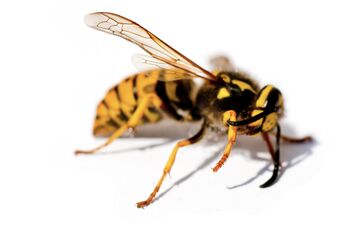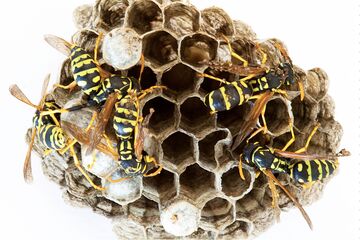How To Get Rid Of Wasps
Wasps are a common pest throughout the UK. These winged insects are known to sting when they are aggravated, and sometimes even unprovoked. Some people are allergic to wasp stings, and even if you don't have an allergy, they are still incredibly painful.
What are wasps?
Wasps are winged insects with bright yellow markings. In some parts of the world, they are known as yellow jackets. They are known for their yellow stripes and are very similar in size to a bee. However, unlike bees, they do not have fuzzy rounded bodies. The bodies of yellow jackets are smooth and shiny with a stinger at the end. Wasps help to pollinate plants, but they don't have the same beloved reputation as bees. However, they do help to keep insect populations in check.
Aggravated wasps will swarm and sting when they are provoked. And while bees lose their stinger after one use, wasps can sting repeatedly. They build nests in tree branches, in sheds, attics and in the eaves of properties. Their papery nests are very different to bee hives.
Find out more about other types of pests

What attracts wasps?
Wasps are attracted to food sources, such as sweet drinks and foods that have been left out in the open. Sweet fruit can also attract wasps, as well as flowers and other plants. If you are trying to get rid of wasps, one of the best things you can do is to avoid leaving sweet and sugary foods around your home. This includes getting rid of fallen fruit, as this will be an excellent food source for wasps.
How to get rid of wasps
If you have a wasp infestation, there are a few methods you can use to get rid of them. One way is to purchase an insecticidal spray and spray it around the nest and surrounding areas. Another option is to hire a professional pest control service. They will be able to identify the species of wasps and treat the problem safely and effectively without posing a risk to your health. You could also try to following DIY methods to deter wasps without going near the nests:
Hang fake wasp nests
Wasps are highly territorial and will avoid nesting anywhere where there is an established next. Hanging a fake wasp nest near the real nest will deter other wasps from making their home nearby. You can purchase fake wasp nests online to help deter future nest building.
Use lemon juice or vinegar sprays
Lemon juice and vinegar are natural deterrents to wasps, so spraying them around the outside of your house may help to keep them away. Fill a spray bottle with the juice or vinegar, and shake it up before spraying it around doors, windowsills, and in gardens where wasps are nesting.
Use lavender oil
Lavender oil has natural pest repellent properties that can help to deter wasps from coming near your home. Mix some lavender essential oil with water and spray it around the edges of your home, including on the windows and doors. As an added bonus, this natural scent will make your home smell wonderful too. This will only keep wasps out of your home but won't tackle the issues of wasps nest nearby.
Use wasp traps
Wasp traps can help to catch wasps and stop them from coming into your home. Place the trap near a window or door where you've seen wasps entering, and they will be drawn to it. Once they enter the trap, they cannot escape and will eventually die. This is a slow method of getting rid of wasps, but it can be an effective way to keep them out of your home.
You can make a homemade wasp trap by cutting off the top of a drinks bottle and turning it upside down on the base. Fill the bottom with sugar water and leave it in a place that is popular with the wasps. The wasps will be attracted to the sugar water and will fly into the trap, but the narrow neck will prevent them from flying out again.
Use repellent to deter wasps
There are a variety of wasp repellents available on the market, such as liquids and granules. Sprinkle the granules around your home or apply the liquid solution directly onto the nest for an effective deterrent. Always read and follow manufacturer instructions carefully before applying these products.
By taking preventative steps and using one of these methods to deter wasps from nesting near your home. If there is an established nest and you need to get rid of it, we recommend seeking professional help. Without the right protective clothing, you run the risk of extensive wasp stings which could be very painful.

Getting rid of a wasp nest safely
If you need to get rid of a wasp nest, make sure you take all the necessary safety precautions. Wear protective clothing as gloves and a face mask to avoid getting stung. Always wait until night time when the wasps are less active and have returned to their nest, this is usually early evening time. Avoid using flammable items like lighter fluid or aerosol sprays to kill wasps, as these items can be dangerous.
Once you have all your safety equipment in place, you can start to remove the nest. Use a broom or garden rake to knock off the outside of the nest and then use a vacuum cleaner with a hose attachment to suck up any remaining wasps and residue. This is an incredibly risky move and it's unlikely that you will be able to protect yourself once you have made the entire nest angry. In most cases, the best way to get rid of wasps is to call in a pest control company.
Related Article: How To Get Rid Of Rats